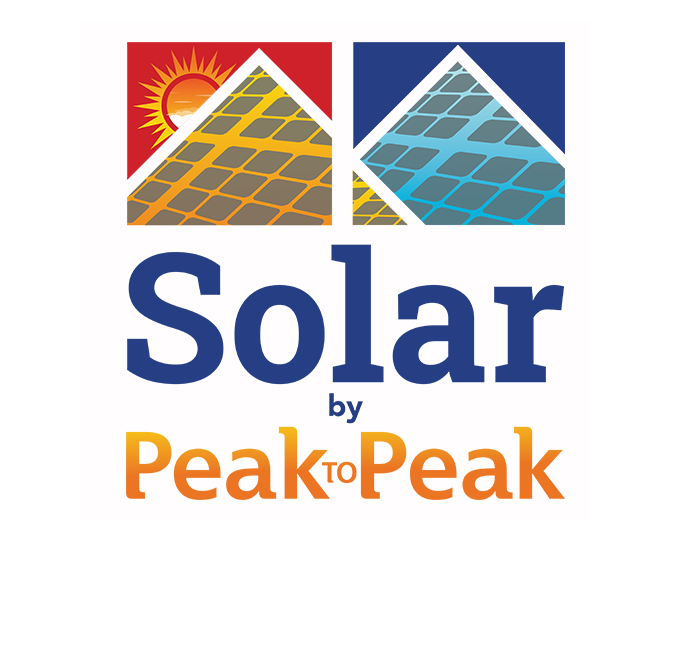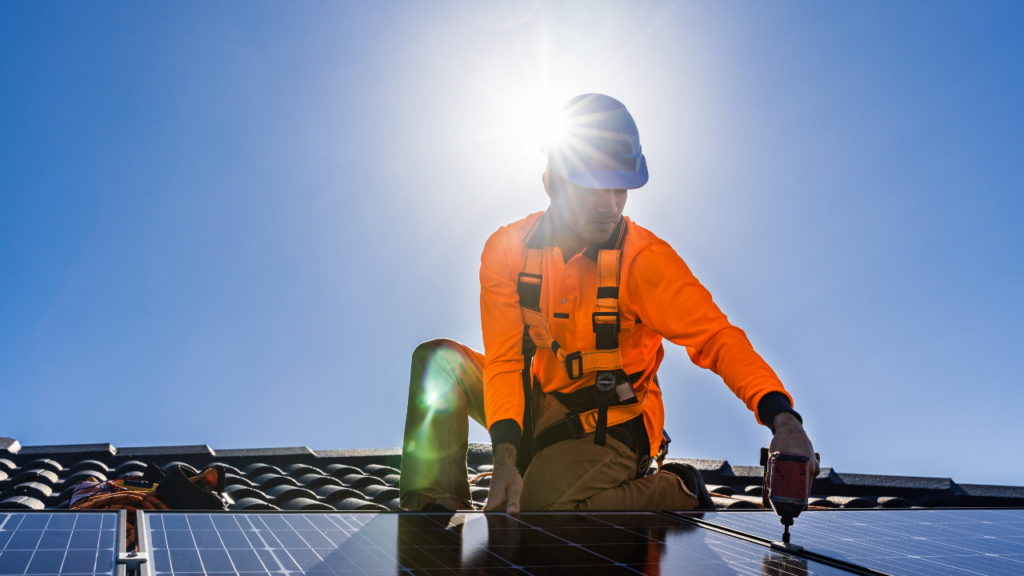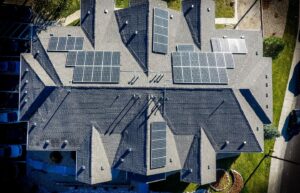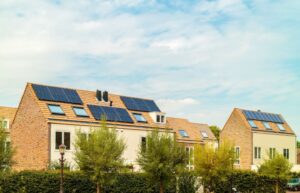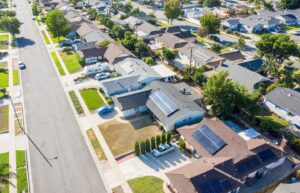Many homeowners in Colorado Springs have finally decided to embrace renewable energy and install solar panels on their homes. By doing so, they can generate electricity that not only reduces their reliance on the power company but also helps in mitigating wind uplift issues commonly faced by tile roofs.
As a solar owner, you can rely on experienced solar installers like Solar by Peak to Peak to set up your solar power system. But here’s the burning question: Do solar panels make your insurance go up?
Below, we’ll discuss how solar panel installations can impact your homeowner’s insurance. We’ll cover the influence of roofs, interest rates, prices, and charges. By the end, you’ll have a clearer understanding of the potential implications for your insurance accounts and be better equipped to make informed decisions regarding your coverage products and prices. It’s important to consider how these decisions can impact your finances.
Harnessing Renewable Power: The Rise of Solar Panels
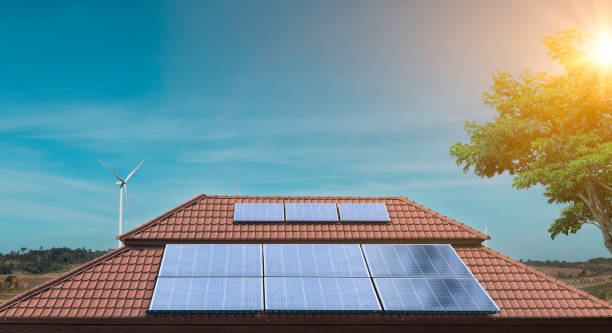
The increasing popularity and adoption of solar panel systems have revolutionized the way we power our homes. These systems are installed on roofs, offer sustainable energy products, and can save money on electricity bills due to their affordable price per ounce.
Solar Energy: A Game-Changer for Homeowners
Solar panels are products that harness the power of sunlight to generate electricity for your roof, reducing reliance on traditional fossil fuel-based sources. They are a cost-effective way to save money and reduce your carbon footprint. This shift towards clean energy not only reduces carbon emissions but also helps combat climate change. It is particularly beneficial for solar owners, who can save money by using solar systems and products.
By installing solar panels, homeowners can significantly reduce their carbon footprint and contribute to a more sustainable future. Additionally, these products can help save on electricity costs in the long run. Whether it’s for a residential or commercial roof, solar panels are an excellent investment that pays off over time. With their durable design and long lifespan, these products are built to last.
Environmental Benefits of Solar Panels
One of the key advantages of solar panels is their positive impact on the environment. Solar panels are products that can be installed on the roof of a home. These products have the ability to harness the power of the sun and convert it into electricity. Kilowatt-hours are a unit of measurement for the electricity that solar panels produce.
By using solar panels, homeowners can reduce their reliance on traditional energy sources and decrease their carbon footprint. Additionally, solar panels can help save money on electricity bills in the long run. Unlike conventional electricity generation methods, such as coal or gas-fired power plants, solar energy production does not emit harmful greenhouse gases or pollutants into the atmosphere. This makes it an environmentally friendly option for powering homes and saving money on electricity bills.
Financial Advantages of Installing Solar Panels
In addition to being environmentally friendly, solar panels offer significant financial benefits for homeowners. Here are some reasons why investing in solar power can be a wise financial decision for your home, money, and products. Additionally, it can also help you save on energy costs and reduce your carbon footprint.
- Tax Incentives for Renewable Energy Products: Many governments offer tax incentives and rebates to encourage homeowners to adopt renewable energy solutions like solar panels and save money. These incentives can help offset the cost of purchasing and installing these energy-efficient products, including solar panels, which can ultimately lead to long-term savings on electricity bills.
- Net Metering: Net metering allows homeowners with solar panels to sell excess electricity back to the grid, earning credits that can further reduce their overall energy costs and save money on their monthly bills. This program is especially beneficial for homeowners looking to make the most out of their investment in solar panels and maximize their savings on energy expenses.
- Increased Property Value: Studies have shown that homes equipped with solar panel systems tend to have higher property values compared to those without them. This increase in property value can help homeowners save money and invest in other areas, such as upgrading their tires.
- Long-Term Savings: Installing solar panels can save you money in the long run, as they have a lifespan of 25 to 30 years. These panels are a great investment for your home and can help reduce your energy costs. Over time, the savings on electricity bills from solar energy systems can outweigh the initial investment, saving money for the home.
Considerations for Solar Panel Installation
Before installing solar panels, it’s important to consider a few factors, such as the condition of your home, the amount of money you are willing to invest, and the durability of the tires.
- Assess whether your home’s roof is suitable for solar panel installation to save money. Factors such as orientation, shading, and structural integrity need to be taken into account when installing solar systems for home solar energy.
- Local Home Regulations: Familiarize yourself with any local home regulations or permits required for solar panel installation in your area.
- Evaluate the solar potential of your home by assessing the amount of sunlight it receives throughout the year. This will help determine the efficiency and effectiveness of your home solar power system.
Does Homeowners Insurance Cover Solar Panels?
Understanding Existing Homeowner Insurance Coverage
If you’re considering installing solar panels on your home in Colorado Springs, Colorado, one of the questions that may come to mind is whether your homeowners insurance will cover them. Before making any assumptions about your existing policy, it’s important to understand the coverage it provides for your home and solar systems.
Potential Limitations or Exclusions in Standard Policies
While some homeowners insurance policies do provide coverage for solar panel systems, it’s crucial to be aware of potential limitations or exclusions. Standard policies may not automatically include coverage for solar energy systems, as they are considered additional structures or improvements to the property. You’ll need to review your policy documents carefully or consult with your insurance provider to determine if coverage for solar systems is included.
Additional Endorsements or Riders for Adequate Coverage
In many cases, obtaining adequate coverage for solar panels may require additional endorsements or riders on your homeowner’s insurance policy. These endorsements specifically address the unique risks associated with solar panel systems and ensure that you are adequately protected against damage or loss.
To obtain this additional coverage, you may need to provide information about the size and value of your solar panel system, as well as any certifications it holds. Working closely with your insurance provider can help you navigate through the requirements for solar systems and secure the necessary endorsements or riders.
It’s essential to discuss these factors with your insurance provider to gain a better understanding of how they may affect your coverage options.
Potential Impact of Solar Panels on Home Insurance Rates
Installing solar panels on your home can have an impact on your home insurance premiums. Insurers take several factors into consideration when determining rate adjustments due to the installation of solar panel systems. It’s important to understand these factors and weigh them against the potential cost savings associated with lower energy consumption from using solar power.
Assessing How Installing a Solar Panel System Can Influence Your Home Insurance Premiums
When you install a solar panel system, it is considered an improvement to your property. This means that it may increase the overall value of your home, which could potentially lead to higher insurance premiums. Insurers take into account the increased value and replacement cost of the system when assessing their risk exposure.
Factors that Insurers Consider When Determining Rate Adjustments Due to Installed Solar Panels
Insurers consider various factors when deciding whether or not to adjust their home insurance rates due to the installation of solar panels:
- Location: Your geographical location plays a role in determining how much risk is associated with insuring homes with solar panels. For example, if you live in an area prone to natural disasters like hurricanes or wildfires, insurers may view the installation as an added risk.
- System size and value: Insurers also take into account the size and value of your solar panel system. A larger and more expensive system may result in higher premiums.
- Maintenance and safety: Insurers will assess whether you are taking proper care of your solar panel system and following recommended maintenance procedures. Safety measures such as fire prevention mechanisms and secure mounting are also crucial factors.
- Warranty coverage: The warranty coverage for your solar panel system is important for insurers, as it provides protection against any potential damage or malfunctioning equipment.
Understanding the Potential Cost Savings Associated with Lower Energy Consumption from Using Solar Power
While there may be a possibility of increased insurance premiums, it’s essential to consider the long-term financial benefits of installing solar panels. Solar power can significantly reduce your energy consumption and lower your monthly utility bills. This can result in substantial savings over time, offsetting any potential premium increases.
Balancing Potential Premium Increases Against Long-Term Financial Benefits
When deciding whether or not to install solar panels on your home, it’s crucial to weigh the potential premium increases against the long-term financial benefits. Consider factors such as the cost of installation, expected savings on energy bills, and the environmental impact of using renewable energy sources.
While there may be an initial increase in insurance premiums, the overall cost savings from reduced energy consumption can outweigh this expense in the long run. It is advisable to consult with your insurance provider to understand how installing solar panels might affect your specific policy and explore any available discounts or incentives for using renewable energy sources.
Disclosure Requirements: Informing Your Insurer About Solar Panels
The Importance of Disclosing Information to Your Insurer
It’s crucial to inform your insurance company about this significant change. Failing to disclose the installation or planned future installation of solar panels may lead to coverage gaps or even denied claims. Insurance companies need accurate information about any modifications made to your property, including the addition of a new electrical system like solar panels. By disclosing this information, you ensure that your policy adequately covers the increased value and potential risks associated with renewable energy systems.
Coverage Gaps and Denied Claims
If you fail to notify your insurer about the presence of solar panels on your property, you run the risk of having coverage gaps in your insurance policy. This means that in the event of damage or loss related to the solar panels, such as fire or theft, you may not be fully covered. Insurance policies are designed based on specific risk factors, and failing to disclose changes in those factors can result in inadequate coverage in Colorado Springs, CO.
In addition to coverage gaps, omitting information about solar panel installations could also lead to denied claims. If an incident occurs that is directly related to the presence of solar panels and you did not disclose them, your insurer may consider it a breach of contract. This could result in a denial of any claim you make for damages or losses associated with the solar panels.
Evaluating Additional Liability Coverage
In Colorado Springs, CO, Installing solar panels introduces new risks that should be considered when evaluating your liability coverage needs. Residential photovoltaic (PV) arrays come with their own set of hazards, such as electrical malfunctions or potential damage caused by extreme weather conditions. It’s important to discuss these risks with your insurance provider and determine if additional liability coverage is necessary.
By assessing the potential risks associated with owning a renewable energy system like a residential PV array, you can make an informed decision regarding additional liability coverage. This ensures that you are adequately protected in the event of any unforeseen incidents or accidents related to your solar panels.
Additional Insurance Policies for Solar Panels

If you’re a solar owner in Colorado Springs, Colorado, it’s essential to consider the impact of solar panels on your insurance premiums. While having solar panels can bring many benefits, such as energy savings and reducing your carbon footprint, it’s crucial to understand how they may affect your insurance coverage.
Specialized Policies for Insuring Residential PV Arrays
You may want to explore specialized policies designed specifically for this purpose. These policies are tailored to address the unique risks and potential damages associated with residential photovoltaic (PV) arrays. By opting for a separate policy dedicated solely to your solar panels, you can ensure that any potential losses or damages are adequately covered.
Equipment Breakdown Coverage for Mechanical or Electrical Failures
Solar panels are complex systems composed of various components that can experience mechanical or electrical failures over time. To protect yourself against these types of issues, it’s worth considering equipment breakdown coverage. This type of coverage provides financial protection in case any part of your solar panel system malfunctions or breaks down due to mechanical failure in Colorado Springs, CO.
Comprehensive Policies Covering Property Damage and Liability
Comprehensive insurance policies offer broader protection by covering both property damage and liability related to your solar panel system. These insurance policies not only protect against physical harm from occurrences like hailstorms, but they also offer coverage in the event that someone were to suffer an injury on your property as a result of a problem with the solar panels. It’s important to carefully review the terms and conditions of such policies to ensure they align with your specific needs.
Evaluating Additional Coverage Needs
While homeowners insurance typically covers some aspects related to solar panels, it may not always provide sufficient protection for this substantial investment. Therefore, it is recommended that you evaluate whether additional coverage is necessary beyond what your existing homeowner’s policy offers. Factors such as replacement costs, hazard warranties, roof coverage limits, and other potential risks should be taken into account when determining the need for supplemental coverage.
Considerations for Savings Accounts
Some insurance providers may offer unique options that can help you save money in the long run. For example, certain insurers may provide a “yield savings account” where a portion of your premium payments is invested and accumulates interest over time. This can result in potential savings on future premiums or even a refund at the end of the policy term.
Evaluating the Relationship Between Solar Panels and Insurance
Installing solar panels on your home can be an exciting and environmentally friendly decision. However, it’s essential to consider the potential impact on your insurance coverage. Let’s delve into the relationship between solar panels and insurance to help you make an informed decision.
Weighing the Potential Risks and Rewards
There are both risks and rewards to consider from an insurance perspective. On one hand, solar panel systems can increase the value of your home while also providing cost savings through reduced energy bills. These benefits make them an attractive investment for homeowners in Colorado Springs, Colorado.
However, it’s important to note that insurers view solar panel systems differently in terms of risk mitigation and loss prevention. While some insurers may see them as a positive addition that reduces reliance on traditional power sources, others may perceive them as potential hazards due to factors like fire or storm damage.
Assessing Insurers’ Perspectives on Solar Panel Systems
Insurers evaluate various factors when determining how solar panel installations affect insurance rates. Location plays a crucial role in this assessment since regions prone to natural disasters or extreme weather conditions may carry higher risks for insurers. Therefore, homeowners in areas like Colorado Springs should be aware of potential variations in insurance rates compared to more stable locations.
The type of installation is another consideration for insurers. Rooftop installations are common but may pose additional risks, such as roof damage or leaks, if not properly installed or maintained. Ground-mounted systems offer alternative options but come with their own set of considerations regarding safety and maintenance.
Finding the Right Insurance Company for Solar Panel Coverage
It’s essential to find an insurance company that understands the unique risks and coverage needs associated with this renewable energy source. Here are some key steps to help you find the right insurance company for solar panel coverage.
Researching Insurers with Experience and Expertise
Start by researching insurers in your area, such as Colorado Springs, Colorado, who have experience and expertise in providing coverage for homes with solar panels. Look for companies that specifically mention solar panel coverage or renewable energy in their offerings. These insurers are more likely to understand the intricacies of insuring homes equipped with solar installations.
Comparing Quotes from Multiple Insurers
Once you’ve identified potential insurers, obtain quotes from multiple companies to compare rates and coverage options. This step is crucial, as it allows you to find competitive rates while ensuring suitable coverage for your specific needs. Don’t settle for the first quote you receive; take the time to explore different options.
Seeking Recommendations from Other Homeowners
Reach out to other homeowners who have installed solar panels and ask about their experiences with different insurance companies. They can provide valuable insights into how well a particular insurer handles claims related to solar panel incidents. Their recommendations can help steer you toward reliable insurers who offer comprehensive coverage and excellent customer service.
Checking Customer Reviews and Ratings
Before making a final decision, check the customer reviews and ratings of insurance companies that offer coverage for homes with solar panels. Pay attention to feedback regarding claims handling processes specific to solar panel-related incidents. Positive reviews indicate satisfied customers who had smooth experiences when filing claims related to their solar installations.
In contrast, negative reviews may highlight issues such as claim denials or difficulties in getting adequate compensation for damages caused by events like hailstorms or power surges. Prioritize insurers that consistently receive positive feedback on their handling of solar panel-related claims.
By following these steps, you can find an insurance company that not only offers coverage for homes with solar panels but also understands the unique risks and challenges associated with renewable energy installations. Don’t rush the process—take your time to research, compare quotes, seek recommendations, and check customer reviews to make an informed decision.
Remember, finding the right insurance company will provide you with peace of mind, knowing that your solar panels are adequately protected in case of unforeseen events or damages.
The Bottom Line: Do Solar Panels Make Your Insurance Go Up?
While adding solar panels to your home can have numerous benefits, it’s important to consider the potential impact on your homeowner’s insurance. It’s crucial to inform your insurer about the presence of solar panels and discuss any necessary adjustments or additional policies required.
When evaluating the relationship between solar panels and insurance, it’s recommended that you shop around and compare quotes from different insurance companies. Look for insurers who specialize in renewable energy coverage or offer specific policies for solar panel installations. By doing so, you can find the right company that provides adequate coverage at a reasonable price.
Ready to make the switch to solar and explore its benefits? Contact Solar by Peak to Peak today, your trusted partner in harnessing the power of the sun for a greener, more sustainable future. Don’t miss out on the opportunity to save on your energy bills and contribute to a cleaner environment. Get started now!
